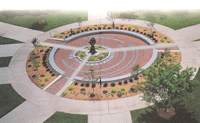
Ruby Kuhns
is honored with a Brick from Elizabeth Hicks, Audrey Hoover, Cathy Klusman, and Carolyn Risley-Hill.
Teacher, circus performer, missionary student. Ruby has done all of these, as well as wife, mother, mentor and socio-political activist.
We came to know Ruby through Wichita NOW (National Organization for Women) in the 1980's. She was the oldest member of our chapter at that time, and a continual prod to us to examine our society for changes. When we asked her how she came to be interested in women's rights, she responded, "I remember the exact day. I had an unusual talent in math. In the ninth grade, I had placed in a state math contest in Emporia. But when I wanted to enroll in another math class in high school, my father said, 'Girls don't take math.' I had long been aware that boys and girls were treated differently. But that statement made me see this was not just a family affair, but an all pervading universal attitude. Those words changed my life."
We asked if her mother had championed women's rights. "When I was little, I noticed a number of excited women coming to our house. They all acted thrilled about something I didn't understand. Later, I realized that women had just won the right to vote. My mother had been a ringleader for suffrage and she dedicated herself to the election board. In those days, votes had to be counted by hand. So mother would be gone the entire day of the election plus that night and into the next afternoon, staying with the ballot box until the results were counted."
Ruby's older brother recorded her birth, June 3, 1912, in Sayre, Oklahoma, in his diary. She was the ninth of 11 children born to Belle Vida and the Reverend Hilary Gilbert Philips. With a strong religious background, Ruby moved to Chicago in 1930 to study at the Baptist Missionary Training School. She had met David Forrest Kuhns at a summer youth rally in Ottawa, Kansas, before her senior year at Hutchinson Kansas High School. He also had gone to Chicago to study at the YMCA College. Two years later they married.
During the Great Depression work was scarce. The church had cut back on missions and had no placement for them. So Forrest worked at the training school as a night guard. Five years later, Ruby found work in a circus where she danced, rode elephants and horses, did aerials and performed in "statues" (tableaus of women dressed in white on tiered platforms.)
Meanwhile, she and Forrest were also performing together. He had been intrigued with magic since childhood when his mother entertained him with tricks. As an amateur magician, he incorporated Ruby into the act, including a sideshow of mindreading.
They continued to perform for local groups during the time he worked for the Wichita School and Shop for the Blind. The students enjoyed a range of social activities and earned money by making brooms and pillowcases. Following World War II they created a "Broom Caravan" with a stage show, including blind people showing their dogs and describing their work. They sold the brooms.
While Forrest worked for the University of Kansas in school assemblies, Ruby returned to the circus in the summers. She hated being away from their children, LeRoy and Kristine, so the Kuhns created their own summer circus. They traveled to county fairs in this region and performed magic, twirling and rolling globe. In the winter they had Santa Claus shows using a bus top decorated with a sleigh for the stage.
They played at many schools and made friends with the principals and teachers they saw each year. One of them thought Ruby would be a great teacher and got a special permit to let her teach reading while she studied for her degree. Because of their involvement with the School for the Blind, Ruby had met Helen Keller. Keller put her hands on Ruby's face to "listen" to her when they met. With Keller as her idol and inspiration, Ruby worked with atypical kids, teaching all special education classes with an emphasis on reading.
With their children grown, Ruby moved to Michigan State University to study post-Master's. It was in Michigan during the mid-1960s that she heard Betty Friedan and joined NOW. She is passionate about the issues: people getting along, children getting hurt, Equal Rights Amendment. "I support women's rights, children's rights, girls' rights, black rights, people's rights!" She wrote letters, made telephone calls and gave contributions when she could. And she continues to do so to this day. All of this was the result of the comment by her dad in 1928, "Girls don't take math."
Since her retirement, she has taught a dancing class at the senior center. Her "Silver Belles" have shown that women who are getting older, just get better. Thank you, Ruby!
Submitted by Liz Hicks, Audrey Hoover, Carolyn Risley Hill, Cathy Klusman, compiled by Liz Hicks
August 31, 1998










